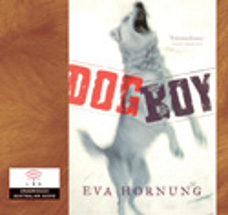Dog boy by Eva Hornung

Read by Bruce Kerr. Louis Braille Audio, 2010. 9 CD's, 10 hours. Text
Publishing Company, 2009.
Highly recommended. Abandoned by his mother
and uncle, Romochka eats everything he finds
in the apartment, until spurred on by hunger and loneliness he
ventures outside, a place his mother warned him never to go alone.
Avoiding strangers, another of his mother's rules, he is taken by a
dog to her lair, and in so doing becomes one of the cubs, suckled,
protected and trained by her. This extraordinary story of the dog's
life lived by this small boy is absorbing, as Horning details how the
boy becomes one of the pack, living in the basement of an old church,
hunting in a pack at night, fending off strangers and developing the
skills to stay alive. He cannot emulate their sight, smell and
hearing skills, but he can use his hands, fashion tools and weapons
and so be of assistance in a different way. And they protect him in
their stead, seeing him as a member of the pack, fighting together,
sharing their food and protecting each other in time of need. At
times he is caught, once by authorities and another by a group of
boys intent on torture and death. His pack comes to his rescue. The
puppy, another boy brought to the lair by the female dog, is caught
by the authorities and in trying to find out if he is alright,
Romochka is taken to a children's home, and eventually comes into
direct contact with its director. Here is a different sort of
nurture, one which is clinical, watchful, with a mind to publish the
results for the further funding of the impoverished home.
Hornung has vastly added to the literature about children raised
with animals, the story is one that has always captured people's
interest and this tale is riveting. Engrossing, intelligent and
informative, the story makes the reader think about ideas; ideas
about our basic needs, about survival and what it is to be human.
Along the way she delights the reader with insights into the
behaviour of animals and what makes them take in a boy to nurture and
defend. And humour abounds in the clinical observations of the
psychiatrists trying to twist new meanings into what they are seeing,
finding a new area of research or twisting known ideas around the
boy's behaviour.
Set in Moscow after Perestroika, the background feels like war, but
is set in an area of Moscow built up and then abandoned; redolent of
hunger and lack of civilisation, while the all encompassing cold
during winter is keenly felt. The vivid setting impels the reader to
sympathise with the boy and
his pack as they roam the streets, scavenging food from all sorts of
places, sometimes grabbing shopping from strangers, sometimes given
food by a sympathetic cook, often crawling over the mountain of
rubbish.
The reader, Bruce Kerr tells this story with a deliberately paced
strong voice, reminiscent of early ABC TV news readers. His steady
thrum is just right, betraying no idea of where the book is set,
focusing our attention on the events surrounding the child's
survival. He varies his voice for the boy's words, and of those he
meets along his journey, but in the main this calm steady voice
underscores the brutality of what is going on.
(The book has deservedly won accolades: Winner, Fiction category,
Prime Minister's Literary Awards, 2010: Shortlisted, Vance Palmer
Prize for Fiction, Victorian Premier's Literary Awards 2009:
Shortlisted, ASL Gold Medal, 2010: Shortlisted, Literary Fiction Book
of the Year, ABIA, 2010.)
Fran Knight